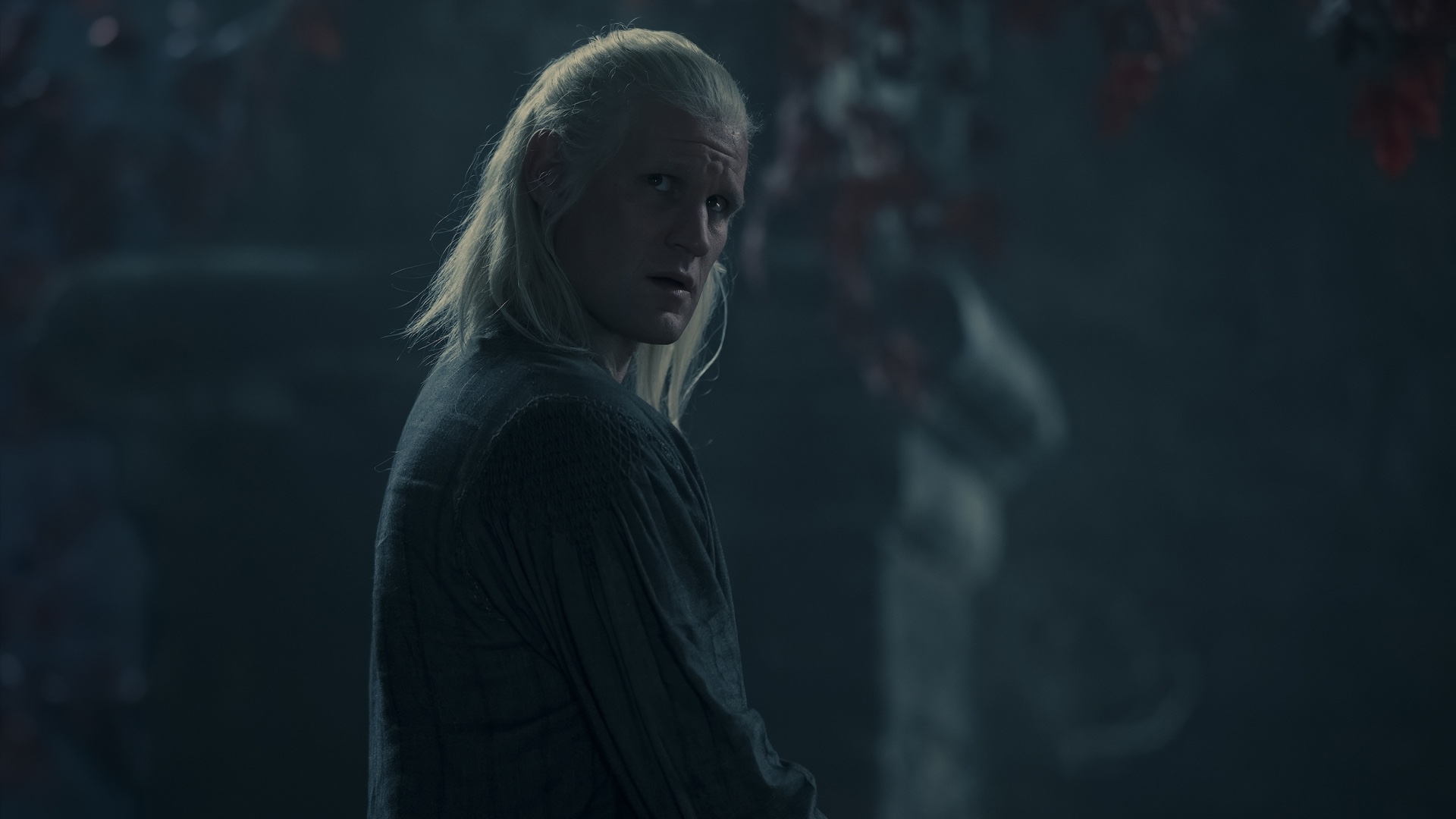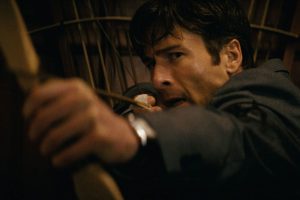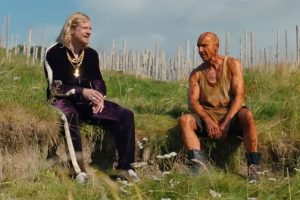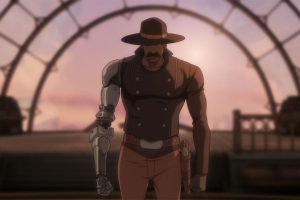
This House of the Dragon review contains spoilers.
No one on House of the Dragon seems to know when the Dance of the Dragons started …or if it has indeed begun at all.
Was the beginning of the war when King Viserys I (Paddy Considine) died and King Aegon II (Tom Glynn-Carney) first crawled up onto the Iron Throne? Was it when Prince Aemond’s (Ewan Mitchell) elderly, confused dragon gobbled up its kin above the sodden shores of The Stormlands? If that didn’t officially kick off the war then surely Blood and Cheese had to do it, right?
And yet, here we are three episodes into the show’s second season, and the participants in this Targaryen civil war continue to look for signs that it’s actually happening. The conflict’s latest benchmark is the battle fought between House Bracken, supporters of King Aegon II; and House Blackwood, supporters of Queen Rhaenyra I (Emma D’Arcy). Historians will call this skirmish “The Battle of the Burning Mill.” However, the first scene of the episode reveals that the Bracken and Blackwood brawl was not a clash of conflicting royal loyalties – it was an argument about land that escalated into a predictable massacre. You know: typical Blackwood and Bracken stuff.
The Blackwood and Bracken feud is one of my favorite bits of in-universe lore in the Game of Thrones canon. The ancient beef between the two Riverland families is much more than just George R.R. Martin’s take on the real life Hatfields and McCoys, it’s a not-so-subtle commentary on how most conflicts within Westeros are so pointless that they might as well be parody.
Aside from the rare occasions that involve the existential threat of White Walkers from Beyond-the-Wall, the vast majority of wars in The Seven Kingdoms probably begin and end just like this Blackwood and Bracken donnybrook does. One moment you’re claiming your sheep has grazing rights beyond those stones. The next moment you’re marinating The Trident with your rancid corpse.
The best part about House of the Dragon thus far, and this episode in particular, is that many of its characters are well-aware of how silly and pointless this all is. Observing the funeral of the twins Ser Arryk and Ser Erryk Cargyll, Princess Rhaenys (Eve Best) tells Rhaenyra that “Otto Hightower would never have allowed this. Hotter blood has prevailed. Soon they will not even remember what started the war in the first place.”
Later on, Prince Daemon (Matt Smith) asks Harrenhal castellan Ser Simon Strong (Simon Russell Beale) for a brief rundown on the history of Blackwood/Bracken conflict, to which the wise old knight responds “The answer to that is lost to time. Sin begets sin begets sin.” Ser Simon, obviously, isn’t just talking about the Blackwoods and the Brackens just like Rhaenys wasn’t talking solely about the conflict at hand. Their wisdom informs the rest of this episode beautifully.
Initially, I did not care for the ending of House of the Dragon season 2 episode 3. Mysaria (Sonoya Mizuno) assisting Rhaenyra’s infiltration of King’s Landing to speak with Alicent (Olivia Cooke) in the Grand Sept initially felt like one penetration of a fortified city too many. First Daemon makes it to the King’s Landing docks in episode 1, then Ser Arryk walks through Dragonstone’s front door in episode 2. Now, Rhaenyra throws on a Silent Sisters robe and makes it into the belly of the beast again? At this point, just keep sneaking in and assassinating people until the war is over.
When viewed in context of the Blackwood and Bracken feud as allegory, however, Rhaenyra’s likely final attempt to avoid disaster makes a lot of sense. Anyone who’s so much as read any book in the Citadel library knows that the Blackwoods and Brackens aren’t the exception to how wars begin in Westeros – they’re the norm. It’s not just the viewer who recognizes the petty Riverland feud as a Game of Thrones parody, the actual characters within Game of Thrones do as well.
While that final Alicent and Rhaenyra conversation still raises some logistical concerns (fast travel has very much been unlocked during House of the Dragon season 2), it’s a thematically appropriate moment. More importantly: it’s an emotionally sound one for the two women involved. Alicent and Rhaenyra are closer in age and closer in relationship in House of the Dragon than they were in George R.R. Martin’s Fire & Blood source material. Getting to lean into the tragedy of the dissolution of this friendship* alongside the dissolution of The Seven Kingdoms has enriched the story immeasurably.
*”Friendship” being a light term here. One can’t help but notice that Alicent finally looses her romantic and sexual feelings for Criston after he ordered a hit on Rhaenyra. Not even his ineptitude leading to the death of her grandson was enough to stop before then.
It’s also led to some unavoidable narrative headaches. There’s no way that Rhaenyra and Alicent, queens on two different sides of a war, would hear each other out one last time. But Rhaenyra and Alicent, the two girls who liked to read under the weirwood tree, would. And honestly, it’s all worth it just to hear Alicent stammer “The C…Conqueror” upon learning that maybe she misinterpreted her late husband’s last words.
The similarity between Rhaenyra and Alicent, and the Blackwoods and the Brackens form the narrative and thematic backbone of this episode. But even beyond that, there really is a ton going on here. Despite being a few minutes shorter than last week’s installment, this week finds ample time for everyone.
The best time spent is, as it so often is, with Daemon. Following his self-exile from Dragonstone, the Rogue Prince has made his way to the crumbling walls of Harrenhal to win the Riverlands to Rhaenyra’s cause. As he makes his way through the ruined, rainy castle, Daemon seems to realize that he was mistaken about the locations’ strategic importance. Aegon the Conqueror and his dragon Balerion really did a number on Harren the Black’s great work.
In the lead up to House of the Dragon season 2, showrunner Ryan Condal and writer Sara Hess teased that the Harrenhal portions of the show would feel like a haunted house movie akin to The Shining. Harrenhal is indeed massively spooky, inhabited only by leftovers of House Strong and an enigmatic servant Alys Rivers (played by Gayle Rankin, look out for more of her going forward). Daemon finds himself tormented by visions of chaos, decay, and destruction, culminating with a truly terrifying moment featuring Milly Alcock’s return as a young Rhaenyra.
“Always coming and going aren’t you? And I have to clean up afterwards,” the Rhaenyra shade tells Daemon as she sews Prince Jaehaerys’ head back on to his pale body.
This kind of abstract exploration of a character’s tortured inner psyche is hard to pull off – as evidenced by Daenerys’ boring sojourn into Qarth’s House of the Undying in Game of Thrones season 2. Daemon’s Harrenhal nightmares work surprisingly well, however. It certainly helps getting the brilliant Alcock back (not to mention the return of last week’s immensely upsetting Jaehaerys corpse prop). But most of the credit must go to Smith. When a dreamy Alys Rivers appears outside the castle walls to tell Daemon “you will die in this place,” the look on his face betrays that he believes her.
Similarly effective this week is the depiction of Aegon’s continued disintegration. Aegon took the prospect of running the Seven Kingdoms seriously for all of a day or two and now the death of his son has him retreating back into his worst tendencies. These tendencies are reflected in his hilariously ineffective selections for new Kingsguard knights following the death of Ser Erryk. One might assume that successive major security failures in both King’s Landing and Dragonston would encourage Aegon and Ser Criston (Fabien Frankel) to hire only the best of the best. Instead they opt for what amounts to Aegon’s frat buddies, who don’t quite understand the whole “vow of chastity” thing.
Criston, meanwhile, is already proving to be a terrible Hand of the King. Putting aside the abhorrent discipline of his Kingsguard, the Dornish knight doesn’t have many good ideas outside of amassing a small host and getting out into the Riverlands. Still, he does have a moment of modest heroism that reminds us why he got the White Cloak in the first place. One might think that “stay out of wide open fields when our enemies have dragons” would be obvious in wartime, but Alicent’s brother Ser Gwayne Hightower (Freddie Fox) wasn’t smart enough to think of it. Criston ultimately saves Gwayne’s life from Baela (Bethany Antonia) and her dragon Moondancer, and in the process seems to make up for the loss of one Hightower’s trust with the gaining of another’s.
Episode 3 also introduces yet another smallfok character of note – Ulf the White (Tom Bennett), a drunken blowhard who claims to be the “dragonseed” of King Jaehaerys I’s son Baelon. Just under halfway through season 2, House of the Dragon now has four enigmatic “normies” to keep an eye on in the form of Ulf, Hugh Hammer (Kieran Bew), Alyn (Abubakar Salim), and Addam (Clinton Liberty). Any pattern-recognizing brain can discern that something is going on here.
House of the Dragon season 2 episode 3 is a narratively chaotic installment that features a logistically challenging ending. Thankfully, The Battle of The Burning Mill at episode’s beginning keeps everything on a strong thematic track. The memory of those Bracken and Blackwood corpses linger throughout to remind us that the colors on crests don’t matter as much as the color of blood draining into a river.
New episodes of House of the Dragon season 2 premiere Sundays at 9 p.m. ET on HBO.
Learn more about Den of Geek’s review process and why you can trust our recommendations here.
The post House of the Dragon Season 2 Episode 3 Review: Sin Begets Sin Begets Sin appeared first on Den of Geek.











